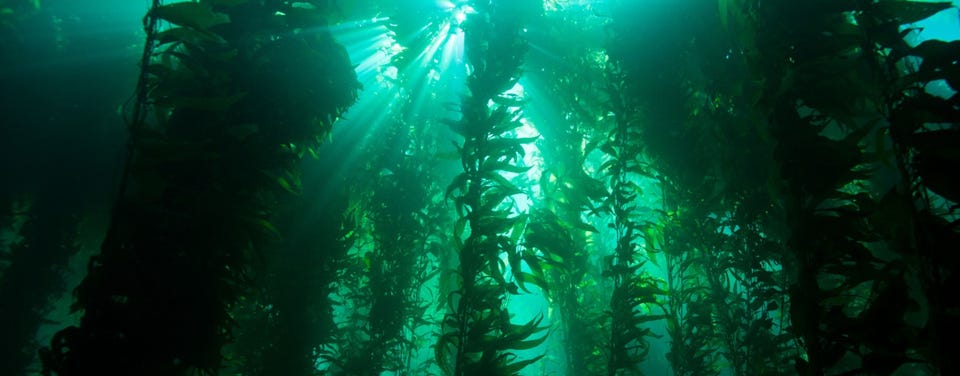Bearing the Deep
Holy breath and learning to go beneath the surface | The Word in the Wild, Pentecost Sunday, Year B
I recently heard an interview with Craig Foster, the documentarian who made the film, My Octopus Teacher. Foster is a student of traditional tracking, and he’s translated those skills to his explorations of the South African kelp forest in which he dives daily. The water there can be cold, but Foster wants to feel as much as possible, so he snorkels and free dives with a minimum of equipment. To bear the cold, Foster uses breath exercises that have helped build his stamina in the water over time.
I listened to this interview as I was reflecting on the scriptures for this Pentecost. Pentecost is about the coming of the Holy Spirit. But in both Greek and Hebrew, spirit and breath are the same word. This is helpful to remember because we tend to spiritualize the Spirit, making this member of the Trinity a specter rather than a concrete actor in the world and body. The scriptures, however, give a physicality to the Spirit representing it as a bird, a wind, a breath, a fire. This is a moving, active, burning member of the community of God’s life.
It takes matter, the vibrations of body and air, to offer a voice, a groan and sigh. In our reading from Romans, the whole creation, the community of the church, and the Spirit all groan. None of us knows what to say in the face of the world unraveled—the hunger of famine, the horror of violence, the pain of loss. But the Spirit can take that groaning, that speechless speech, and communicate it to God.
It is through the Spirit that our hearts, our minds and bodies, are linked into God’s life. Breath is both inhale and exhale—oxygen and carbon dioxide. These are the exchanges we make with the life all around us, our breath feeding their breath, theirs ours. I sit in my shed, offering a deep exhale and the Catalpa tree beyond my window will catch some of that. It breathes back oxygen, and I catch some in return. And so it is with the Spirit, giving and receiving so that we are brought into the continuum that is that greater life of God.
Breathing well, breathing deeply, learning to go slowly with our inhale, to hold our breath ever longer, to exhale in measured patience—these are exercises that calm our bodies, developing our nervous system. Free divers do these exercises to help them explore the waters, to withstand the cold and pressure of the deep. Learning to breathe the Spirit enables us to descend beneath the surface, going beyond the discomfort and pain of the unknown, so that we can explore the deep places of God’s life.
In John’s Gospel, Jesus tells his disciples: “I still have many things to say to you, but you cannot bear them now.” At that moment, before the last breath of the crucifixion, before the new inhale of the resurrection, the disciples cannot bear the wonders of the deep. It is only after these things that the Spirit of Truth will come. It is through the breath of that Spirit that they will be prepared for life below the surface, where beyond the pain of this new territory, they will experience the awe of an ever more profound reality.
As anyone who has seen My Octopus Teacher knows, Craig Foster’s experiences in the Great African Seforest have been a true wonder, and that film focuses its lens on just one of many encounters with a wild world beneath the surface. Such a world exists all around us and within us, but we have to prepare ourselves to bear the dive toward the deep. To go deep into the mysteries of God, we must learn to breath a different kind of air. The feast of Pentecost reminds us that the new air has come among us in the Spirit. Our task, now, is learn to breath from this Holy source. Once we do, we will be able to bear the journey across the threshold to a new, and wonder-filled land.


